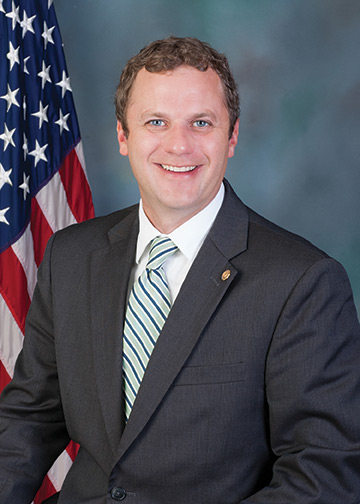Most of us have had our lives changed since March when the COVID-19 pandemic started, but few have had a bigger shift in their routine than State Rep. Tommy Sankey.
“The job has completely changed,” Sankey, a Republican from the 73rd district who is serving his fourth term, said in a recent interview.
He went on to explain that once the capital opened, no one was accepting personal guests. “The face-to-face stuff is gone.”
Instead there have been a lot of Zoom meetings and phone calls.
Saying the job “used to be really fun,” Sankey explained with committee dinners, meeting new members and events like ribbon cuttings.
Another difference is that everything on the calendar is extremely important and must be dealt with as soon as possible.
Previously, when he was done for the day, he could leave and the phone didn’t ring.
Now things are “completely different” and “it’s exhausting”. Every day he is on the phone, sometimes until 11 p.m.
The top issue for residents contacting Sankey has been the Pandemic Unemployment Assistance system, which many have had problems with and have still not been paid.
“I don’t know what happened,” he said blaming the problem on “the decision makers at the top.”
The Web site took a month to finish and when it opened at 7 a.m., it crashed that same morning at 7:15 a.m.
Sankey commented it was unacceptable that people were unable to get someone on the phone from the Department of Labor & Industry to help them.
For his own office, the phones were transferred to staff working at home. He noted that authorities in Colorado hired an answering service to handle the large number of calls regarding unemployment, which gave people at least someone to answer the phone.
Then there are those that have gotten money from the PUA who didn’t apply as is the case with a fellow representative, he said, received two checks totaling $7,000.
Just last week Pennsylvania Attorney General Josh Shapiro announced that 33 inmates and their accomplices were being charged for obtaining PUA funds “to which they were not entitled,” according to a press release.
There is still $1 billion in the state treasury for those unemployed, Sankey said. “Thousands have still gotten nothing.”
Among those impacted with the PUA problems was Sankey’s mother who complained that the questions in the system as to why people were unemployed were incomplete for weeks because they were missing a key Federal qualification for self-employed and contracted workers, while warning people with dire consequences if they lied.
Responding to the many requests for help, he often said, “If I can’t help my mother, I can’t help you.” Still, if you are having problems with PUA, he does encourage you to contact him.
During the pandemic, he has been busier than usual doing Facebook posts and news releases to keep people updated on the situation. “The reality is things are changing minute by minute.”
Commenting on all the false information circulating on social media, he mentioned a post by one person that claimed everyone would have to register all their guns immediately and that gun shops would be closed for three days.
He had to tell everyone this was not true as he was flooded with calls.
Another big issue has been whether the children should be allowed to go back to school. “Going forward, we have got to keep the kids in school,” he said.
He showed concern for the younger children who may fall behind with basic skills such as reading and math, limiting their continued learning.
In addition, “teachers identify kids that have problems.” This includes signs of physical or emotional abuse and malnutrition.
When asked about the situation for some students that don’t have access to a high-speed Internet connection, he explained he is on the committee working on expanding Internet access to rural areas.
A problem with this issue is getting the right of way to use the existing utility poles from the utility companies.
These companies such as Verizon and Comcast, realize it is not feasible to run their lines through the rural areas, due to a small amount of potential customers, but they also don’t want anyone else to take their customers, he explained.
One of his top priorities is to find funding for this but it will take time to organize it.
A possible answer is for residents to form a co-op with the state supplying the infrastructure and the communities doing the installation. “People don’t say they want free Internet. They say they would pay for good Internet.”
This is a necessity moving forward as more children will be educated at home and more people will be working from home in the future. Also, businesses need reliable high-speed Internet to compete in the global market, he stated.
“We can’t kick the can down the road anymore (on this problem.) The state needs to make an investment and do the ground work.”
Businesses forced to close or limit the amount of customers in their buildings have also been calling Sankey.
“Businesses are struggling with restrictions” he commented, then noted that during the H1N1 pandemic in April of 2009 to April of 2010, 50 million people were infected, but the country “didn’t close down.”
According to information from the Centers for Disease Control and Prevention, over 60 million people were infected with H1N1 and there were 12,469 deaths in the United States during that first year.
Through this difficult time, Sankey has this advice. “I don’t want people to quit. There is no spirit like the American spirit.”
